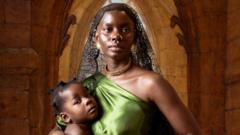Dola Posh wears many hats: she is a photographer, a Nigerian woman, a mother, and a Briton. However, after giving birth during a pandemic, she grappled with her identity. Just six days postpartum, she found herself in an English hospital, burdened with the changes in her life and the looming uncertainty of her future in photography, her passion. Family, distant and unable to visit due to lockdown restrictions, constantly checked in on her, adding to her pressure. Left alone with her thoughts, Dola felt as though she was losing herself: “I thought: ‘I’m me; the baby’s out, I’m still me.’ But no, I wasn’t me any more.”
The loss of one's sense of self can be a significant trigger for postnatal depression, a condition that disproportionately impacts black women. Initially, Dola did not recognize that she was experiencing this struggle. After leaving the hospital, she found herself overwhelmed with advice on motherhood, creating a sense of disempowerment. “I wasn’t given the chance to be a mother,” she recalls, reminiscing about the emotional turmoil of 2020.
In a particularly dark moment, exacerbated by exhaustion and isolation, Dola battled with thoughts of self-harm. Clutching a blanket for comfort, she turned to her child, Monioluwa, whose name means "I have God" in Yoruba, finding solace in singing traditional songs. A call for help to her health visitor marked a turning point in her battle against depression. Despite her initial shame, she began to see a therapist who encouraged her to use photography as a coping mechanism.
With a background in photography developed in Nigeria, Dola had previously built a name for herself in fashion and celebrity portraiture. In order to express her struggles, she turned the camera on herself, creating an intimate portfolio that included images of her and Monioluwa. These portraits, reminiscent of the maternal themes prevalent in Western art, unfolded organically, drawing on her upbringing in a religious household, where images of the Virgin Mary influenced her subconscious.
Dola explains how wearing a veil during her shoots helped her reconnect with her identity and heritage. “When I put on the veil, it didn’t feel like that empty person any more. It felt more me,” she shared, finding comfort in the familial essence it invoked.
As she continues to document her emotions, Dola is determined to share her story of the multifaceted journey of motherhood and the stigma surrounding postnatal depression among black women. Receiving an award from Leica this year has significantly boosted her mission, allowing her to expand her work and inspire others. She aspires to create a world where black mothers feel supported, visible, and understood through media representation.
“It’s new for a woman to stand there and say: ‘I almost ended my life, I’m not ashamed of it,’” Dola declares, emphasizing her resilience as both an artist and a mother. She embodies a voice for those navigating the complex terrain of motherhood and mental health, aiming to spark an open dialogue about the challenges faced by many. For those affected by similar issues, resources are available through the NHS and other mental health organizations, underscoring the importance of community support in healing.
The loss of one's sense of self can be a significant trigger for postnatal depression, a condition that disproportionately impacts black women. Initially, Dola did not recognize that she was experiencing this struggle. After leaving the hospital, she found herself overwhelmed with advice on motherhood, creating a sense of disempowerment. “I wasn’t given the chance to be a mother,” she recalls, reminiscing about the emotional turmoil of 2020.
In a particularly dark moment, exacerbated by exhaustion and isolation, Dola battled with thoughts of self-harm. Clutching a blanket for comfort, she turned to her child, Monioluwa, whose name means "I have God" in Yoruba, finding solace in singing traditional songs. A call for help to her health visitor marked a turning point in her battle against depression. Despite her initial shame, she began to see a therapist who encouraged her to use photography as a coping mechanism.
With a background in photography developed in Nigeria, Dola had previously built a name for herself in fashion and celebrity portraiture. In order to express her struggles, she turned the camera on herself, creating an intimate portfolio that included images of her and Monioluwa. These portraits, reminiscent of the maternal themes prevalent in Western art, unfolded organically, drawing on her upbringing in a religious household, where images of the Virgin Mary influenced her subconscious.
Dola explains how wearing a veil during her shoots helped her reconnect with her identity and heritage. “When I put on the veil, it didn’t feel like that empty person any more. It felt more me,” she shared, finding comfort in the familial essence it invoked.
As she continues to document her emotions, Dola is determined to share her story of the multifaceted journey of motherhood and the stigma surrounding postnatal depression among black women. Receiving an award from Leica this year has significantly boosted her mission, allowing her to expand her work and inspire others. She aspires to create a world where black mothers feel supported, visible, and understood through media representation.
“It’s new for a woman to stand there and say: ‘I almost ended my life, I’m not ashamed of it,’” Dola declares, emphasizing her resilience as both an artist and a mother. She embodies a voice for those navigating the complex terrain of motherhood and mental health, aiming to spark an open dialogue about the challenges faced by many. For those affected by similar issues, resources are available through the NHS and other mental health organizations, underscoring the importance of community support in healing.




















